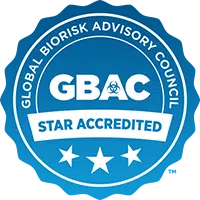The COVID pandemic made a lasting impact in commercial custodial services, and brought a heightened awareness to the importance of cleaning protocols. Now more than ever, employees look to their company’s leaders to keep the workplace safe and healthy. And customers want to be reassured that the business they’re entering has been cleaned with their health in mind. In other words, “clean” is no longer enough. Building occupants want to know that the space they’re in is regularly disinfected and free of contagion.
To help businesses meet this need, in 2020 the Global Biorisk Advisory Council (GBAC), a division of ISSA, created the GBAC Star Facility Accreditation. Facilities that display the GBAC Star seal let visitors know that the building they’re entering is safe and hygienic.
The GBAC Star seal is one way that businesses can show both employees and customers that their well-being matters, giving these companies a distinct competitive advantage. So it’s no surprise that nearly 2,000 businesses across a range of industries have adopted the protocols necessary to earn GBAC Star certification. From Hyatt Hotels to American Airlines, businesses are using the GBAC Star seal to signal their dedication to their customers, employees, and other stakeholders.
Commercial Cleaning at a Higher Level
In today’s post-pandemic world, the GBAC Star has become the gold standard in facilities accreditation. Companies at this level have created a cleaning, disinfection, and infectious disease prevention program that is designed to minimize an occupant’s exposure to infectious agents. At these facilities, cleaning and disinfection protocols combat not just COVID but other biohazards as well.
This is why five of the 20 program elements required for GBAC Star certification deal specifically with cleaning supplies and their management. Among other requirements, facilities must use EPA-approved, broad-spectrum chemicals shown to eliminate coronaviruses and other infectious agents. In addition, companies must abide by strict inventory control procedures, as well as defined waste management protocols. And of course, PPE must be used by cleaning staff when indicated.
The Need for Highly Trained Commercial Janitorial Professionals
Gone are the days when a custodian could be hired, handed a push broom and a supply trolley, and told where to start cleaning. To meet and maintain the high standards of GBAC Star certification, cleaning staff must be specially trained in the safe use of powerful cleaners and disinfecting agents. They must learn specific cleaning and sanitizing protocols that vary with the type of space. And they must become experts in outbreak response and infectious disease prevention.
This requires the development of a comprehensive training program for the people hired to clean your facilities. Such a program must include education in the proper use, storage, and disposal of various cleaning materials. Custodians must be able to recite and carry out emergency response protocols, and understand the details of today’s enhanced infection-control techniques.
In addition, GBAC Star certification requires that custodial managers receive biohazard response training. These managers must also strictly control the inventory of cleaning chemicals, and maintain up-do-date personnel training records.
Custodial Services You Can Rely On
The steps needed to achieve GBAC Star certification—and the expertise required to maintain that certification—can be daunting. If your company would prefer to focus on your core business, you can still earn GBAC Star certification by making sure your contracted service provider has the training and expertise to meet the GBAC’s stringent requirements.
At PRIDE Industries, we have thirty years of experience keeping commercial and public facilities sparkling clean. As a CIMS-GB certified company, we utilize industry best practices to create safe and healthy work environments for businesses and their employees.

